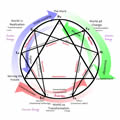The Place of Emotions in Reasoning
2015-01-19
Our emotional nature enters into the reasoning process in three quite distinct but interrelated ways.
The first way is that emotions and our emotional nature have to be fully accounted for in any situation. Constructing a logical process full of “shoulds” which ignores the emotional reactions we all have is bound to fail. This is easy enough to say, but the variety and complexity of emotional influences we are all subject to, creates a profound challenge. Nevertheless, it’s a challenge that has to be met.
The second way is that the emotional center can contribute something to the reasoning process that thinking, logic, or even higher intelligence can’t provide. Here we’re not talking about a low level functioning of the emotional center in terms of reactions, likes and dislikes, and other conditioned habits of functioning. We’re talking about a much higher level of functioning where the emotional center has a capacity for direct, holistic perception of what “is”.
The third way is where reason works with emotions toward a common understanding. Once aligned, the emotional center provides something else of critical importance, and that is the energy to effectively drive the actualization of the reasoning process. But even with the high level perceptions that the emotional center is capable of generating, it is still mostly focused on “what is”. Therefore the reasoning process needs to lead the emotional center toward what “isn’t”, toward creativity, toward the impossible.
One other reminder about the emotional center. Like all centers it has its own ‘will’. One aspect of that will is what the emotional center understands. Understanding gives the emotional center the ability to “do”. When that will, that understanding, is integrated with the will of the other centers, then the entire reasoning process can move toward real transformation. But each center, not just the emotional center, has to make its own ‘decision’ that it’s better to cooperate and integrate rather than rebel and separate. This, too, takes understanding.
- John Hutcherson's blog
- Log in to post comments
